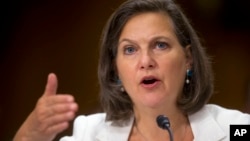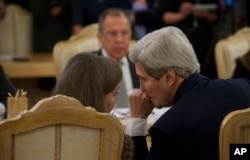U.S. Assistant Secretary of State Victoria Nuland’s surprise trip to Moscow is evidence of a new push for progress on implementing the peace deal for Ukraine signed last year in Belarus' capital, Minsk.
Nuland’s trip began Tuesday, just a day before the Trilateral Contact Group meets in Minsk to try to break a political deadlock over holding elections in Ukraine’s east, known as the Donbas, where Russia-backed rebels control large swathes of territory.
The State Department said Nuland would meet with senior Russian government officials to discuss the situation in eastern Ukraine and the next steps to implement the Minsk agreements.
The Minsk peace deal, signed in February 2015, managed to bring a halt to major battles between Ukrainian and Russian-backed troops, but has hit major hurdles regarding the region’s status, the fate of rebel leaders, and holding legitimate elections.
“Judging by the comments of the Russian and Ukrainian parties, they still hold the same positions as before despite all pressure put onto them, positions that are difficult to align if that's possible at all,” says Victor Mironenko, head of the Center for Ukrainian Studies at the Russian Academy of Sciences’ Institute of Europe.
The U.S. is not a party to the contact group, made up of officials from Russia, Ukraine, and the Organization for Security and Cooperation in Europe (OSCE). But Washington is a key ally of the government in Kyiv since a 2014 popular uprising in Ukraine ousted a Russia-backed president.
The Kremlin responded to that uprising by annexing Ukraine’s Crimea and giving military support to rebels in Donbas, and relations with the West hit their lowest level since the Cold War.
Biggest Problem: Politics
Two years of war in eastern Ukraine has left over 9,000 people dead and left Donbas’s two rebel-controlled areas, the self-declared Donetsk and Lugansk "people's republics," mostly cut off from the world and dependent on Russia.
But while occasional clashes raise questions over the first step in the agreement, a cease-fire, analysts say the more challenging problem is negotiating the region’s political future.
“They are exhausted, first of all. And, there can be no military victory on the ground,” says Alexander Baunov of the Carnegie Moscow Center. “In Ukraine, they understand very much that if they make an attempt to regain the lost territories of the separatist republics by military force, Russia will intervene."
“Separatists probably have other goals: they would like very much to add to their republics the other territories of both regions — Lugansk and Donetsk, respectively,” says Baunov. “But, for (the) Russians, for Putin, for (the) Kremlin, it doesn't make any sense; it's too risky, it's too expensive to keep them, to defend them; there's no big support among the local population, even among the population that has pro-Russian sentiments."
“The problem is not so much military as it is political,” says Mironenko. “The heart of the matter is that Russia has 'fallen out' of the all-European process. The impulse that had been given by perestroika turned out to be insufficient. Having 'fallen out,' it is pulling Ukraine in its wake."
Mironenko argues greater U.S. involvement might help. "With due respect to the efforts of Germany and France and taking into account the attitudes of Russia and Ukraine, the formats of the talks must be changed by increasing the number of participants, involving a more active participation of the USA and broadening understanding of ... European security," he says.
Donbas Elections — A Major Sticking Point
While the conflict simmers, negotiators have focused on trying to hammer out elections for eastern Ukraine so the region can be reintegrated, at least on the surface, with the rest of Ukraine.
But the Russia-backed rebels have dismissed allowing pro-Ukrainian political candidates to take part in elections in Donbas, leading many to conclude legitimate elections there are impossible.
“Probably we will see Donbas elections, but ... they won't be elections (like) elections in any other Ukrainian region,” says Baunov. “It's just impossible to do on the ground. I can't imagine how the current Ukrainian political parties can be represented in Donbas."
Ukrainian officials have argued for armed OSCE election monitors, which Russia rejected.
“With the present status quo, the elections do not look possible in my view,” says Mironenko. “But, even if Ukraine agrees to hold them under the pressure of the countries supporting it, it will put forward such conditions that Donetsk and Lugansk, supported by Russia, wouldn't accept."
Russia Wants Political Sway
Meanwhile, Russia has been pushing Ukraine to give the region broad autonomy and to amnesty rebel leaders, conditions Kyiv has resisted because of popular sentiment against what is seen as appeasement.
Critics say granting autonomy risks making the Donbas a client state of Russia and giving it perpetual leverage over Kyiv under a veil of political legitimacy.
Ukraine was not happy with the Minsk agreement from the beginning, notes Baunov. “So, they actually feel that the Minsk agreement just formulates the conditions of the defeat of Ukraine in the war against separatists supported by Russia," he says. "And, they don't want to accept in their political system the regions governed by very dubious people."






